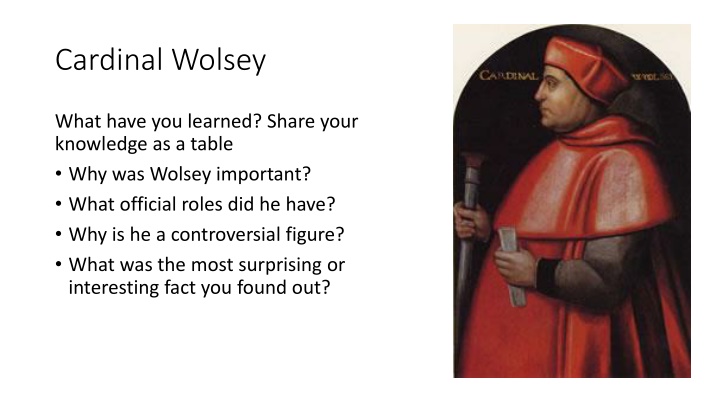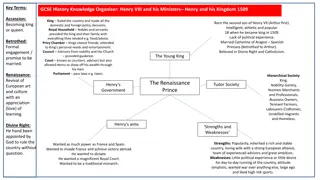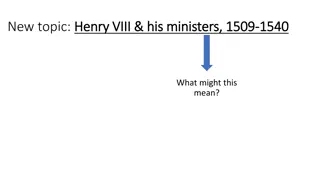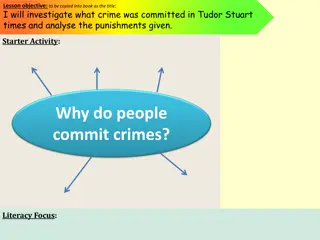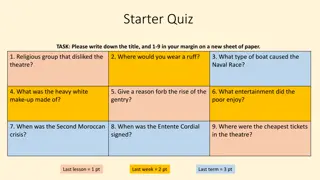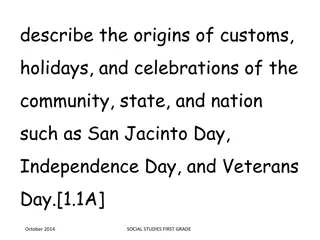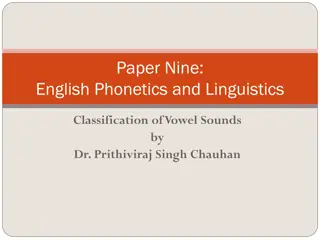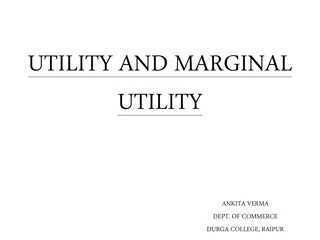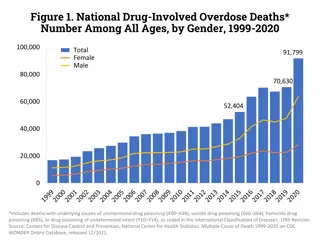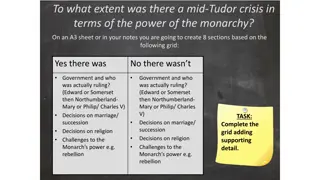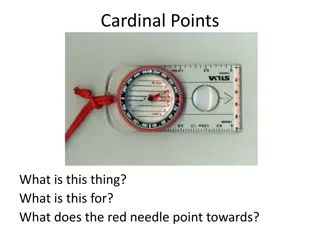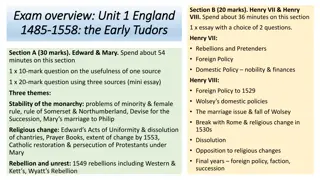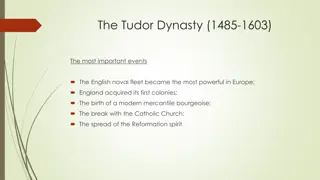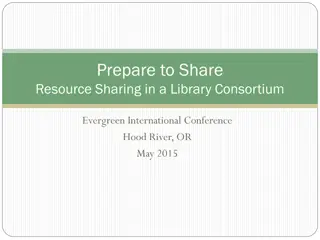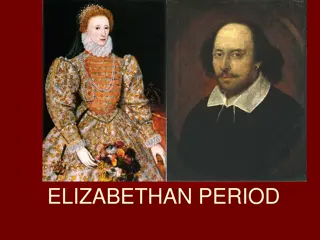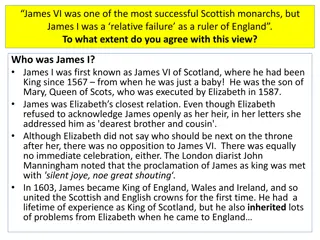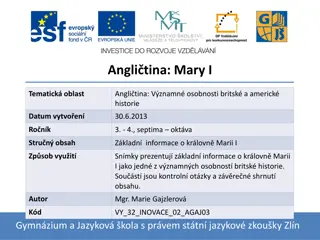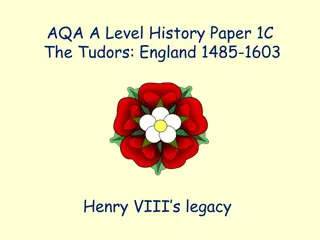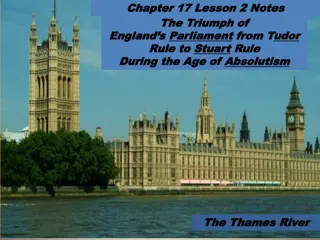Cardinal Wolsey: The Influential Figure in Tudor England
Cardinal Wolsey was a significant figure in Tudor England, holding various official roles such as Lord Chancellor and Chief Minister to King Henry VIII. He was appointed Cardinal in 1518, wielding both religious and political power. Wolsey's controversial nature stemmed from his influence on the Pope, his efforts to reform the Church, and his loyalty to Catholicism despite Henry VIII's break from Rome. One intriguing fact was Wolsey's pivotal role in Henry's denunciation of Martin Luther.
Download Presentation

Please find below an Image/Link to download the presentation.
The content on the website is provided AS IS for your information and personal use only. It may not be sold, licensed, or shared on other websites without obtaining consent from the author.If you encounter any issues during the download, it is possible that the publisher has removed the file from their server.
You are allowed to download the files provided on this website for personal or commercial use, subject to the condition that they are used lawfully. All files are the property of their respective owners.
The content on the website is provided AS IS for your information and personal use only. It may not be sold, licensed, or shared on other websites without obtaining consent from the author.
E N D
Presentation Transcript
Cardinal Wolsey What have you learned? Share your knowledge as a table Why was Wolsey important? What official roles did he have? Why is he a controversial figure? What was the most surprising or interesting fact you found out?
Wolseys religious roles Appointed Cardinal 1518 under pressure from Henry VIII. He wielded influence and power as Henry s Lord Chancellor and Chief Minister Henry and Wolsey also put pressure on the Pope to make Wolsey papal legate (someone appointed by the Pope to be the Pope s representative in a particular country usually for a specified period of time) 1524 Granted title Legatus a Latere , which meant he was in a particularly powerful position as he could act on behalf of the Pope. This gave him a lot of power to reform the Church as he saw fit. However, he was fundamentally loyal to the Pope and to the Catholic Church. He helped Henry write his denunciation of Luther
The Other King The English Pope
Wolsey as an administrator Industrious Ambitious Organised Energetic Dedicated Intelligent
E START - Criticisms of the Church the European context 1517 a German Priest called Martin Luther set out an argument criticising many elements of the Catholic Church. He wrote up his criticisms the 95 theses and nailed them to the door of the Wittenburg Castle Church He stressed the importance of the Bible and criticised many Catholic rituals
An extract from the 95 theses 5. The Pope cannot remit any penalties other than those which he has imposed 21. Therefore those preachers of indulgences are in error who say that by the Pope s indulgences a man is freed from every penalty and saved 24. It must needs be, therefore, that the greater part of the people are deceived by that indiscriminate and high-sounding promise of release from penalty 43. Christians are to be taught that he who gives to the poor or lends to the needy does a better work than buying pardons 62. The true treasure of the Church is the Most Holy Gospel of the glory and the grace of God Can you summarise these criticisms? Why might these appeal to some people?
Power of Pope over other men is limited esp. over Kings Pope has no power of absolution only GOD Indulgences are a fraud and a con! Christians should live the gospel message buying pardons is selfish fraud we should forgive those who sin against us and asked for their forgiveness of our sins The Bible is the ultimate Christian reference point - WofG
Wolsey and Church Reform In role as cardinal 1518 (above any other churchman in England) and Papal legate 1524 HVIII pushed Pope to make his Wolsey both roles shows power / influence of Henry and the confidence he had in Wolsey Read the section on Wolsey and Church reform (page 50-51) Note down: Ways Wolsey was successful at reforming the Church Limitations to this Who would criticise him and why Why didn t Wolsey go further
Source work Look at Source F on page 51 Underline any words you don t understand Look them up in a dictionary Pick out the judgements made about Cardinal Wolsey in Source F (I got three separate judgements). Summarise each judgement in your own words What evidence can you find that agrees/disagrees with each judgment in Source F (some evidence might be valid for more than one judgement)
Source F 3 judgements there is nothing in Wolsey s administration of the Church of England to justify in terms of reform the enormous legatine powers devolved on him from the papacy Wolsey did not make the most of the powers he had to make reforms. He could have gone much further because he had the power to do so.
Source F 3 judgements Wolsey was not the deeply corrupt, power-mad prelate of Protestant legend Has been judged too harshly by Protestants he did actually make some reforms and wasn t only interested in his own power
Source F 3 judgements Neither was he the kind of inspirational, reforming leader that English Catholicism needed if it was going to surmount the twin challenge of doctrinal rebellion and growing conflict between Church and state Wasn t forceful and inspirational enough to protect the Church from the Lutheran challenge and Henry s increasing desire for control over the Church.
Source F 3 judgements Neither was he the kind of inspirational, reforming leader that English Catholicism needed if it was going to surmount the twin challenge of doctrinal rebellion and growing conflict between Church and state
Wolsey and government, legal, financial, economic reform Successes and limitations in each area Who would criticise Wolsey and why? Who would benefit from Wolsey s reforms? To what extent? In which area was he most/least successful and why?
Critics and Supporters who would criticise or support Wolsey and why what events / action link to judgement Who would criticise Wolsey and why? Parliament Landowners Nobles and clergy Minions What's the key point about his critics evaluate Who would benefit from Wolsey s reforms? To what extent? The poor
Overall judgement as Kings Chief Minister / Advisor / Lord Chancellor and as RC Cardinal two separate roles (are they??) Limited success in all areas, except relations with Parliament. Perhaps most successful in legal changes as he faces least opposition here and didn t have any really humiliating climb downs. Any reformer will always be thwarted by powerful vested interests Evaluate with regard to his relations with King in place for most of Henry s reign - stability
Government under Wolsey as Henrys Chief Minster What did he do and why (K&U) did it work (A&E) Overall judgement Not effective Effective Very powerful individual other King (OMS!) loyal to King and uses power to advance Henry (esp in ) and his own interest / ideas esp in law and Govt Church Church Govt and Parlt (power institutions) Govt and Parlt (power institutions) Challenges power of nobles, seen as pro ordinary citizen Legal Legal Financial (tax and spend) Financial (tax and spend) Potential split loyalties Henry and Pope Great Matter Economic (money and trade) Economic (money and trade) Moderate reformer who Incurred ire of nobles, landowners and lawyers low born upstart
